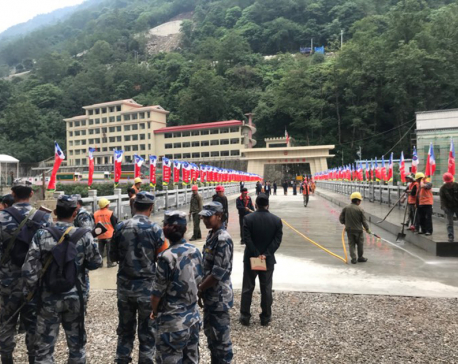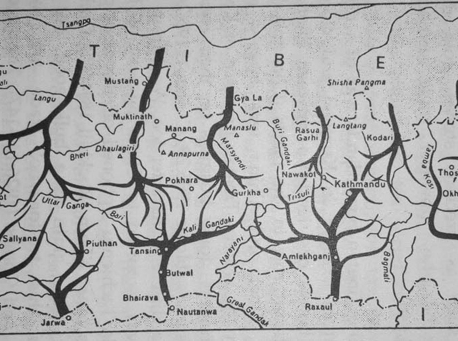
OR
Trade with China through Tatopani
Published On: April 29, 2019 02:00 AM NPT By: Republica | @RepublicaNepal
After four years of complete closure, Nepal’s trade with China through Tatopani border point is resuming, most probably from May 20. This is good news for the locals, businessmen as well as the country. For one, when the devastating earthquakes of 2015 ravaged Tatopani and Khasa, it had not only brought Nepal’s trade through this route to a standstill but also robbed of livelihood of locals and led to the huge loss of revenue (per month revenue in import and export taxes would amount to millions from this point). The small traders who brought in goods from across the border and sold them in Kathmandu and other towns of Nepal lost the source of income all of a sudden. And regions in Sindhupalchok, Kavre and Dolakha districts turned into ghost towns in the aftermath of earthquakes, with business activities coming to a complete stop. Now that the border point is opening for trade, it has raised new hopes among all. According to the Ministry of Commerce and Industry, the border point will come into operation soon after dry port at Larcha (Tatopani) (constructed with the support of Chinese government) will be handed to Nepal government on May 20. Internal preparations have been expedited for the purpose.
Needless to say, Tatopani border point was the only functional artery to Nepal’s trade with China until 2015. Rasuwa-Kerung point was not operated for business until that time. The government focused on Rasuwa-Kerung only after bearing the brunt of 2015 Indian blockade. If Tatopani border point was operational in September 2015, Nepalis would not have to suffer as much for goods would be coming through this trading point. Araniko Highway—with history of geopolitical implications—has to be kept functioning and properly maintained, if we are to reap benefits of trade with China. A couple of things must be ensured for its smooth operation. First, and obvious, is maintenance. As the road passes through the treacherous mountains along raging Bhotekoshi River, considerable length of it gets broken, or destroyed by landslides or floods every monsoon. Thus the Department of Road will have to keep its maintenance operative ready round the clock during the rainy months, which have already started. When the roads block, trade comes to a standstill, business suffers and traders have to bear the huge loss. Besides, with the increased mobility of vehicles along the road, the existing road is surely going to be too narrow. The government of Nepal will have to upgrade and widen the highway as well. Second, Araniko Highway in the past has earned the notoriety of being a channel of smuggling various goods such as gold and red sandalwood.
Chinese side has always taken Araniko Highway as security-sensitive. Often, their concern is related to possible infiltration of anti-China elements through this road. While Nepali side has to ensure that no such activities will take place at this border point and along the road, it also has to use this road for the purpose of legal business and legal mobility. Operation of Tatopani point should also not come to mean undermining the importance of Rasuwa-Kerung trade point. If Nepal is to keep trade with China smooth and running, both these routes need to be kept smooth and running.
You May Like This

Make Tatopani passage reliable
The Tatopani border point, which remained closed for four years following the devastating earthquakes of April 2015, has been resumed... Read More...

Tatopani border point reopening today
SINDHUPALCHOWK, May 29: The Tatopani border point, Nepal's vital and the oldest trading point with the northern neighbor China that was... Read More...

Where we failed on trade
Major trade routes Nepal struggles to open with China today were customary trade routes to travel and supply goods to Tibet... Read More...





Just In
- Save the Children report highlights severe impact of air pollution on children
- NATO Serving as a Catalyst to Fuel Violence
- Home Minister denies any delay in providing relief to wildfire and fire victims
- Ties with Tehran
- CM Kandel requests Finance Minister Pun to put Karnali province in priority in upcoming budget
- Australia reduces TR visa age limit and duration as it implements stricter regulations for foreign students
- Govt aims to surpass Rs 10 trillion GDP mark in next five years
- Govt appoints 77 Liaison Officers for mountain climbing management for spring season













Leave A Comment